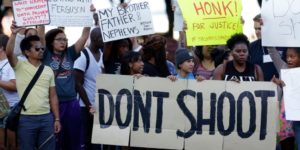
In Arizona, Republican lawmakers voted to seize the assets of people who took part in protests that later turn violent. Photo by the Associated Press.
In an era of organized protests over everything from police shootings of unarmed Black men to the inauguration of a contested U.S. president, Republican legislators in at least 18 states are looking to curb mass demonstrations by proposing bills that would criminalize those who participate in them.
From Arizona to Indiana and even Washington state, GOP lawmakers have introduced bills that would up the punishments for blocking major highways, prohibit the use of masks and face coverings during protests, and give motorists permission to assault demonstrators with their cars, among other things, The Washington Post reported. Supporters of the proposed bills say they’re necessary in fighting against “paid” and “professional” protesters who set out to intimidate and cause disruptions.
“You now have a situation where you have full-time, quasi-professional agent provocateurs that attempt to create public disorder,” said Republican Sen. John Kavanagh of Arizona in support of a proposed measure there that would bring racketeering charges against some demonstrators.
Legal experts agree that such claims spouted by Kavanagh and other anti-protest proponents are largely overstated, arguing that the measures they’ve proposed might threaten citizens’ First Amendment freedoms. For instance, a bill introduced in Michigan would hike monetary fines for certain “mass picketing” behaviors and make it easier for courts to shut down such demonstrations, according to The Washington Post. In mid-January, an Indiana lawmaker proposed a bill that would instruct law enforcement to clear protesters off major roadways using “any means necessary.”
Legislation in states like Colorado, North Dakota and Oklahoma take a different approach by criminalizing protesters in the wake of longstanding demonstrations that occurred near the Dakota Access Pipeline. For instance, the Oklahoma legislature is weighing a bill that would increase legal penalties for trespassing on “critical infrastructures” like pipelines and railroads.
Meanwhile, in Arizona, lawmakers have voted to seize the assets of individuals who plan or participate in protests that turn violent, the Arizona Capital Times reported.
“Wouldn’t you rather stop a riot before it starts?” Rep. Kavanagh asked colleagues earlier this week during a debate on the matter. “Do you really want to wait until people are injuring each other, throwing Molotov cocktails, picking up barricades and smashing them through businesses in downtown Phoenix?”
Lee Rowland, a senior attorney with the American Civil Liberties Union, argued that the bills proposed by Republican legislators aren’t about filling supposed gaps in the law, as there are already rules on the books in every city and every state about highway obstruction. Rather, she said, it’s about “increasing the penalties for protest-related activity to the point that it results in self-censorship among protesters who have every intention to obey the law.”
Still, Republican legislators and even President Donald Trump have accused demonstrators of being “professional anarchists” and “thugs.”
Professional anarchists, thugs and paid protesters are proving the point of the millions of people who voted to MAKE AMERICA GREAT AGAIN!
— Donald J. Trump (@realDonaldTrump) February 3, 2017
None of the proposed legislation has been passed into law just yet; several bills have already been shelved.


